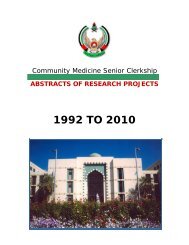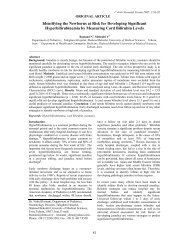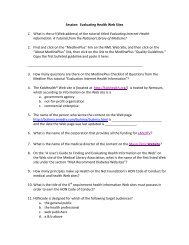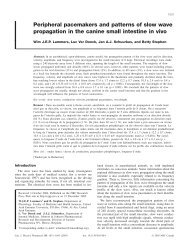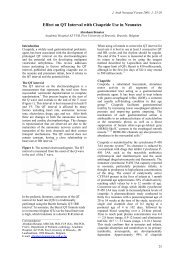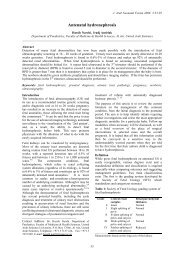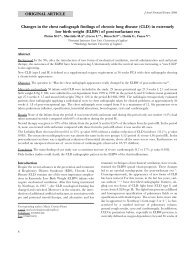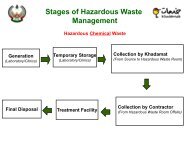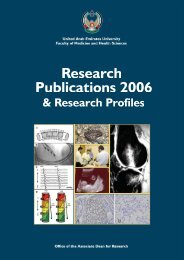Research Profile - College of Medicine and Health Science - United ...
Research Profile - College of Medicine and Health Science - United ...
Research Profile - College of Medicine and Health Science - United ...
Create successful ePaper yourself
Turn your PDF publications into a flip-book with our unique Google optimized e-Paper software.
Department<br />
<strong>of</strong> Pharmacology<br />
<strong>Research</strong> <strong>Pr<strong>of</strong>ile</strong><br />
Pr<strong>of</strong>essor & Chair:<br />
Pr<strong>of</strong> G Petroianu<br />
Pr<strong>of</strong>essor:<br />
Pr<strong>of</strong> A Adem<br />
Pr<strong>of</strong> MY Hasan<br />
Associate Pr<strong>of</strong>essor:<br />
Dr S Bastaki<br />
Dr M Oz<br />
Assistant Pr<strong>of</strong>essor:<br />
Dr S Attoub<br />
Medical <strong>Research</strong><br />
Specialist:<br />
Ms N Amir<br />
Ms K Arafat<br />
Mr SM Nurulain<br />
Mr A Shamsllisam<br />
Medical Secretary:<br />
Ms S Duncan<br />
Central Facilities<br />
Medical <strong>Research</strong><br />
Specialist:<br />
Dr M Kosanovic<br />
Animal House<br />
Veterinarian:<br />
Dr M Al Sultan<br />
Medical <strong>Research</strong><br />
Specialist:<br />
Mr M El Wasila<br />
Mr M Shafiullah<br />
The Pharmacology Department has special<br />
interests in Diabetes <strong>and</strong> Degenerative<br />
Diseases, Neuroscience, Clinical Toxicology,<br />
Gastroenterology <strong>and</strong> Oncology. The research is<br />
done with state <strong>of</strong> the art equipment in purposebuilt<br />
laboratories with good technical <strong>and</strong> other<br />
support.<br />
Pr<strong>of</strong>. Abdu Adem<br />
Diabetes<br />
Mechanisms <strong>of</strong> Apoptotic Cell Death in Diabetes<br />
In almost all multicellular organisms, cell suicide or apoptosis<br />
appears to play an important role in the maintenance <strong>of</strong> cellular<br />
homeostasis. Apoptosis is tightly regulated by a set <strong>of</strong> genes that<br />
either promote apoptosis or promote cell survival. Although a<br />
number <strong>of</strong> stimuli appear to trigger the process <strong>of</strong> apoptosis,<br />
there are two major signaling pathways <strong>of</strong> apoptosis: the death<br />
receptor pathway <strong>and</strong> the death receptor-independent or<br />
mitochondrial pathway. Mechanisms <strong>of</strong> apoptotic cell death are<br />
being studied in kidneys <strong>of</strong> an animal model <strong>of</strong> diabetes. The ultra<br />
structural features in the tubules seem to implicate apoptosis in<br />
the pathology <strong>of</strong> renal nephropathy. In addition we reported, for<br />
the first time, a significant loss <strong>of</strong> foot processes <strong>of</strong> podocytes<br />
(*) in the diabetic rat kidney (Fig.1 left). These findings could<br />
contribute to the underst<strong>and</strong>ing <strong>of</strong> the patho-physiology <strong>of</strong><br />
diabetic nephropathy.<br />
Neurodegenerative Diseases<br />
Novel Selective Lig<strong>and</strong>s for Muscarinic Acetylcholine<br />
Receptors<br />
Five muscarinic acetylcholine receptor subtypes (M1- M5) have<br />
been cloned <strong>and</strong> are found in the brain. However, the<br />
pharmacological identification <strong>of</strong> the subtypes responsible for<br />
the various central effects <strong>of</strong> the muscarinic drugs is difficult due<br />
to the lack <strong>of</strong> highly selective muscarinic agonists <strong>and</strong><br />
antagonists. We have isolated muscarinic M1 <strong>and</strong> M4 receptor



